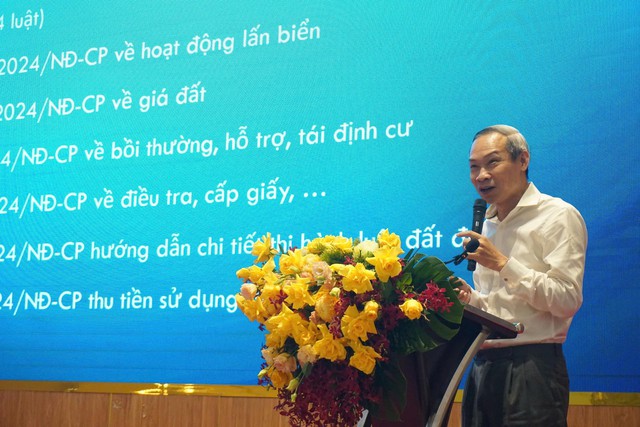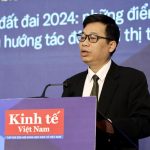Mr. Phan Duc Hieu acknowledged the Government’s significant efforts in enacting the Land Law 2024, the Housing Law 2023, and the Real Estate Business Law 2023, which came into effect on August 1, 2024.
Discussing the Land Law 2024 specifically, Mr. Hieu identified five key aspects: protecting the rights and legitimate interests of land users; facilitating land access to promote a transparent and fair market; improving land use efficiency; implementing land-related financial policies; and enhancing the effectiveness of state management.
The law clearly embodies the principles of “market, transparency, fairness, and comprehensiveness” in land matters. Land acquisition for production purposes is predominantly achieved through market mechanisms such as auctions, tenders, transfers, and conversions, with direct allocations being very rare. These mechanisms promote transparency, and the law provides clear guidelines for direct allocations as well.
However, for the market to be truly “fair and comprehensive,” it must encompass all types of real estate, not just a specific segment. Mr. Hieu suggested that relying solely on the Land Law 2024, even with the implementation of a new land price framework and market-based land valuation methods, could lead to rising land prices rather than a decrease.
“I believe that in our country, it is not just necessary but also ‘urgent’ to immediately introduce a policy on tax on vacant real estate properties, commonly known as ‘second homes.’ With this tax policy in place, the real estate market will be regulated and will fluctuate according to genuine market forces,” emphasized Mr. Hieu.
He expressed a desire for measures to tighten the market and suggested that Resolution 18 be presented and discussed in the National Assembly to establish clear regulations on real estate taxes, thereby fostering a healthier and more efficient market.
During the workshop, a more detailed analysis of the aspect of land access to avoid bias was presented, suggesting the consideration of three factors: subject, project type, and land type. There are three ways to obtain land for production and business: state land retrieval, land-use conversion, and negotiation if the state does not retrieve the land. The law drafting committee and the government have carefully reviewed the law to ensure no overlaps, discrepancies, or loopholes.

Mr. Phan Duc Hieu, Permanent Member of the National Assembly’s Economic Committee
There are two prevalent mechanisms for the state to retrieve land for allocation or lease to enterprises: auctions and tenders. In rare cases, land may be allocated without going through an auction or tender process.
Regarding land retrieval, Article 79 of the Land Law 2024 stipulates the retrieval of land for socio-economic development and national interests, significantly differing from the previous Land Law. This complies with Article 54 of the Constitution, which states that the state shall retrieve land only when it is truly necessary for national interests. Otherwise, a negotiation mechanism will be employed. Land allocation or lease can be achieved through non-auction or non-tender processes, auction of land-use rights, or tender for investor selection.
According to Article 124 of the Land Law 2024, land not subject to auction or tender includes land for projects where the state retrieves land as per Article 79 of the Law, such as public-private partnership projects; land lease for production and business purposes when the lessee must relocate due to environmental pollution; and support for land lease to continue production and business activities in cases of land retrieval from non-agricultural land users.
The final case is when land put up for auction of land-use rights twice fails to attract any participants, as outlined in point b of Clause 6, Article 125 of the Law.
On the other hand, the auction of land-use rights involves land managed by the state, excluding land allocated without auction or tender or land subject to tender. The law also stipulates the conditions, procedures, and processes for auctions, following the Law on Asset Auction.
Regarding tender for investor selection, the tender process entails allocating or leasing land to the winning investor for a project involving land use. The procedures are governed by the Law on Bidding.
The law introduces three mechanisms for consensual land transfer: first, the transfer or receipt of land-use rights; second, the loss of land-use rights; and third, non-transfer or business cooperation. The transfer of rights includes sale, donation, capital contribution, and land-use conversion.
According to Article 127 of the Land Law 2024, except for commercial housing, negotiation takes precedence over land retrieval. If a project proposal falls under the category of state land retrieval, and the investor wishes to propose a consensual land transfer, they will be allowed to receive the transferred land rather than the current “rigid” regulations.
In cases where an investor already owns land and intends to develop a project that falls under state land retrieval, the common understanding is that the state will retrieve the land and reallocate it to the same investor, who will then need to convert the land-use purpose.
Additionally, the new law encourages consensual land transfers. Individuals without land-use certificates but meeting the conditions for issuance are allowed to participate in land transfers, capital contributions, leasing, and subleasing. For instance, if an investor agrees to receive transferred land-use rights, they may need to negotiate with multiple individuals or households. The law provides flexibility by not mandating a halt to the auction process or an extension of the land ownership deadline for those whose term has expired, allowing negotiations to continue after reaching agreements with all parties.
Accessing land for real estate projects involves a broader market, including not just commercial housing but also social housing, official housing, resettlement housing, mixed-use housing, industrial parks, industrial clusters, and high-tech parks. The approach to land access varies depending on the type of housing (scope, authority, and methods).
For commercial housing, if the investor intends to develop commercial housing on land subject to state retrieval, the state will only retrieve the land for projects constructing urban areas with mixed functions, integrated technical and social infrastructure, and in accordance with construction laws. This includes either building new urban areas or renovating existing ones. If the state does not retrieve the land, the investor is free to negotiate and transfer land for commercial housing construction. When the state does not retrieve the land, there are two options for developing commercial housing: first, negotiating and transferring land for construction, and second, converting the land-use purpose to commercial, provided that the land includes both commercial and other types of land. This provision is the result of careful consideration by the government and the National Assembly.
For renovating apartment buildings, negotiations can be held with relevant ministries. In cases where negotiations are not possible or unsuccessful, the Land Law allows for land retrieval to construct or renovate apartment buildings.
Regarding social housing, land can be converted for social housing construction. If land is not yet available, and the project falls under the category of state land retrieval, the state will either retrieve the land or provide a mechanism for negotiation and renovation of apartment buildings. The remaining real estate types largely follow the same approach as the previous law.
Furthermore, the law introduces business cooperation in land use, a new concept in the Land Law. With this cooperation, land users do not need to transfer their land-use rights to the recipient; instead, both parties sign a business cooperation agreement.
Ensuring Effective Implementation of the Land Law 2024
According to Deputy Minister of Natural Resources and Environment, Le Minh Ngan, the workload for preparing the necessary content to ensure the effective enforcement of the Land Law 2024 from January 1, 2025 is significant, as it requires the completion of 9 Decrees, 6 Circulars, 1 Prime Minister’s Decision, and 18 detailed local provisions.
Removing Land Policy Bottlenecks, Creating New Resources for Development
The passing of the Land Law by the National Assembly has been well-received by society, with expectations that policy barriers and bottlenecks will be quickly dismantled and eliminated. This will effectively utilize land resources, contributing to the creation of new resources that will promote socio-economic development…
Revitalizing the potential and maximizing the land resources – Minister of the Ministry of Natural Resources and Environment, Dang Quoc Khanh
Minister of Natural Resources and Environment, Dang Quoc Khanh, emphasizes that by adhering to the guidelines set forth in Resolution 18/NQ-TW, the Land Law 2024 will serve as the foundation for efficient land management and utilization, driving our country towards becoming a high-income developed nation.
Real Estate Market: New Year’s Starting with Motivation
The amended Land Law has introduced several new regulations to support the real estate market, with real estate businesses reporting profits and many social housing projects completing registration… These are the driving forces behind the rapid recovery of the market.




















